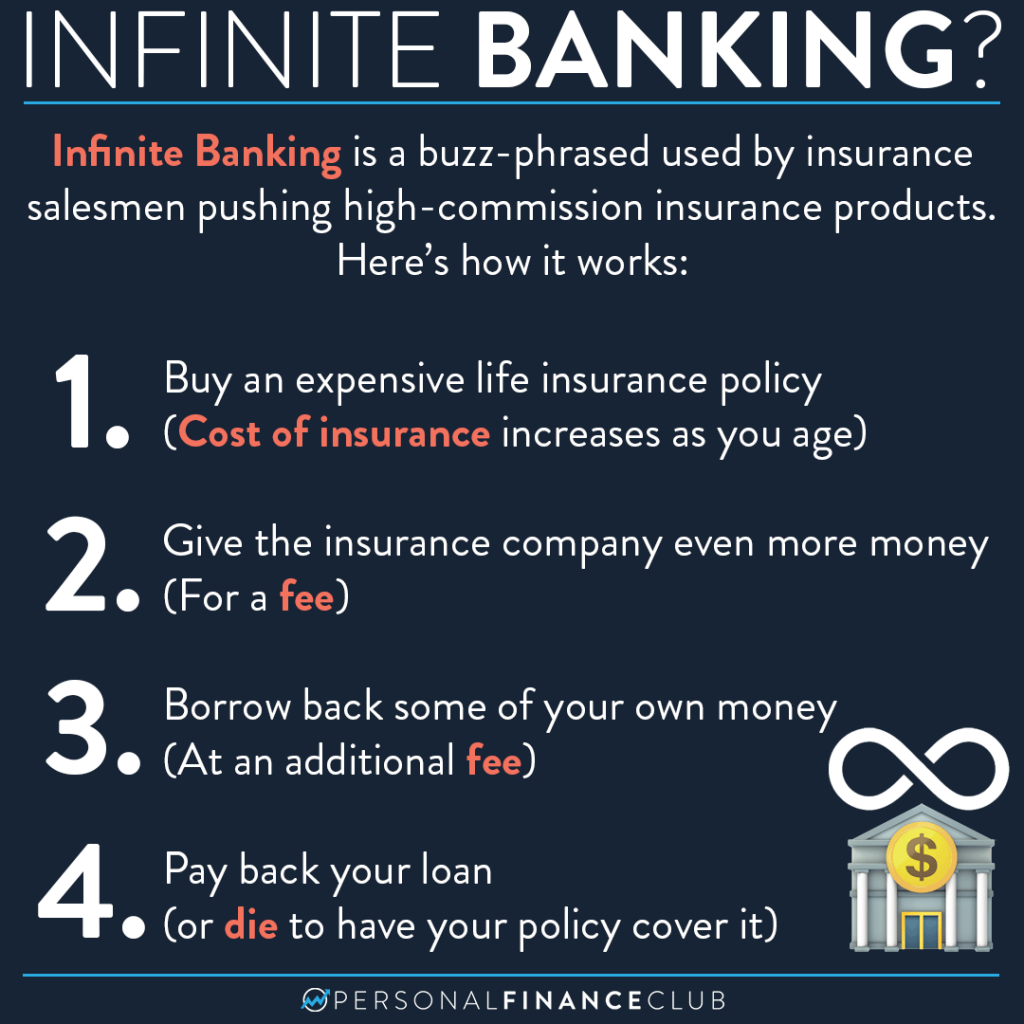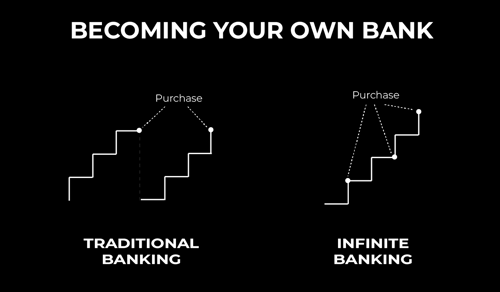All Categories
Featured
Table of Contents
Okay, to be fair you're actually "financial with an insurance business" instead than "financial on yourself", yet that principle is not as easy to offer. Why the term "boundless" financial? The concept is to have your money operating in multiple locations at the same time, rather than in a solitary area. It's a little bit like the concept of acquiring a home with cash money, then obtaining versus your house and placing the cash to operate in one more investment.
Some people like to chat regarding the "rate of cash", which essentially implies the exact same thing. That does not imply there is nothing rewarding to this idea once you obtain past the marketing.
The whole life insurance policy market is pestered by extremely costly insurance, massive commissions, unethical sales methods, low prices of return, and poorly informed customers and salesmen. But if you wish to "Rely on Yourself", you're mosting likely to have to fall to this industry and actually get entire life insurance policy. There is no alternative.
The warranties fundamental in this product are critical to its feature. You can borrow versus most types of cash money value life insurance policy, however you shouldn't "bank" with them. As you get an entire life insurance coverage plan to "bank" with, bear in mind that this is a completely separate section of your economic plan from the life insurance coverage section.
Acquire a large fat term life insurance coverage policy to do that. As you will certainly see below, your "Infinite Financial" policy actually is not going to reliably give this vital economic function. One more trouble with the reality that IB/BOY/LEAP depends, at its core, on an entire life plan is that it can make acquiring a plan bothersome for many of those curious about doing so.
Infinite Banking Spreadsheet
Dangerous pastimes such as SCUBA diving, rock climbing, skydiving, or flying additionally do not blend well with life insurance policy items. That may work out fine, considering that the point of the policy is not the fatality advantage, but keep in mind that acquiring a plan on small youngsters is extra pricey than it ought to be because they are typically underwritten at a "common" rate rather than a preferred one.

A lot of policies are structured to do one of 2 points. The compensation on a whole life insurance coverage policy is 50-110% of the very first year's premium. Sometimes policies are structured to make the most of the death benefit for the costs paid.
The price of return on the plan is very important. One of the best means to maximize that element is to get as much cash as possible right into the plan.
The ideal method to enhance the rate of return of a policy is to have a relatively tiny "base plan", and afterwards placed even more cash money into it with "paid-up additions". Instead of asking "Exactly how little can I place in to obtain a certain fatality advantage?" the concern comes to be "Just how much can I lawfully took into the policy?" With even more money in the policy, there is even more cash value left after the prices of the survivor benefit are paid.
A fringe benefit of a paid-up addition over a regular costs is that the commission rate is reduced (like 3-4% rather than 50-110%) on paid-up enhancements than the base plan. The less you pay in compensation, the higher your price of return. The price of return on your cash worth is still going to be unfavorable for some time, like all money worth insurance coverage.
But it is not interest-free. It might cost as much as 8%. The majority of insurer just supply "direct acknowledgment" finances. With a straight recognition car loan, if you borrow out $50K, the returns price related to the cash worth yearly only uses to the $150K left in the plan.
Infinite Financial
With a non-direct acknowledgment car loan, the firm still pays the same reward, whether you have actually "obtained the cash out" (technically versus) the policy or not. Crazy? Why would certainly they do that? That recognizes? However they do. Typically this function is coupled with some much less beneficial aspect of the policy, such as a reduced returns price than you may receive from a plan with straight acknowledgment loans (infinite banking vs bank on yourself).
The firms do not have a resource of magic cost-free money, so what they give up one place in the plan have to be drawn from one more place. If it is taken from a function you care less around and place right into an attribute you care more about, that is a great thing for you.
There is another critical function, usually called "wash finances". While it is excellent to still have rewards paid on cash you have gotten of the plan, you still have to pay rate of interest on that car loan. If the dividend rate is 4% and the funding is charging 8%, you're not specifically coming out ahead.
With a clean funding, your loan rate of interest is the very same as the returns rate on the plan. While you are paying 5% passion on the finance, that rate of interest is totally offset by the 5% dividend on the lending. In that respect, it acts simply like you withdrew the money from a financial institution account.

5%-5% = 0%-0%. Same very same. Therefore, you are now "financial on yourself." Without all three of these variables, this plan merely is not mosting likely to work quite possibly for IB/BOY/LEAP. The most significant concern with IB/BOY/LEAP is individuals pushing it. Almost all of them stand to benefit from you acquiring into this idea.
As a matter of fact, there are numerous insurance coverage representatives speaking about IB/BOY/LEAP as a function of entire life that are not in fact marketing plans with the necessary attributes to do it! The problem is that those who know the idea best have a huge problem of rate of interest and generally pump up the advantages of the idea (and the underlying plan).
Infinite Financial Group
You must contrast loaning versus your plan to withdrawing money from your financial savings account. No money in cash money worth life insurance coverage. You can put the cash in the bank, you can spend it, or you can get an IB/BOY/LEAP plan.
It expands as the account pays passion. You pay taxes on the passion annually. When it comes time to buy the watercraft, you take out the cash and purchase the watercraft. You can conserve some even more cash and placed it back in the banking account to start to gain passion once more.
When it comes time to purchase the watercraft, you offer the investment and pay tax obligations on your long term resources gains. You can conserve some even more money and acquire some even more financial investments.
The money value not utilized to spend for insurance coverage and payments grows throughout the years at the returns price without tax obligation drag. It starts with adverse returns, yet with any luck by year 5 or so has damaged even and is expanding at the dividend price. When you most likely to acquire the boat, you obtain against the policy tax-free.
Infinite Bank Statements
As you pay it back, the cash you repaid starts growing once more at the dividend price. Those all job quite in a similar way and you can contrast the after-tax rates of return. The fourth alternative, nonetheless, works really differently. You do not conserve any type of cash neither acquire any type of financial investment for several years.
They run your credit report and provide you a financing. You pay passion on the borrowed cash to the financial institution till the finance is paid off. When it is settled, you have a nearly worthless watercraft and no cash. As you can see, that is not anything like the initial 3 choices.
Latest Posts
How To Be Your Own Bank With Whole Life Insurance
Infinite Banking Insurance Companies
Becoming Your Own Bank